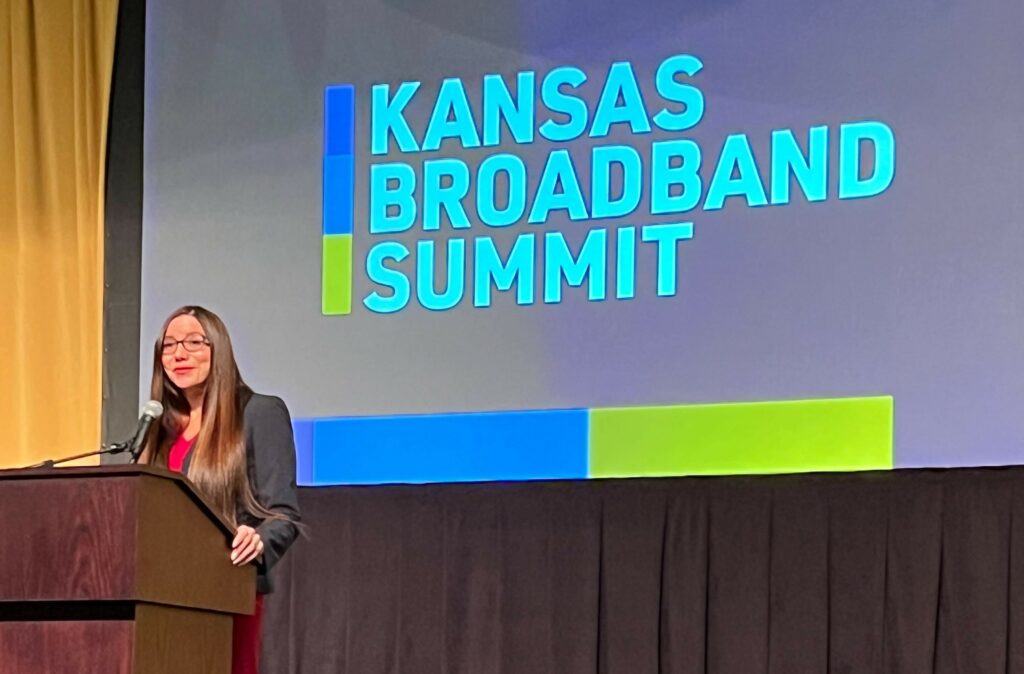The state of Kansas kicked off its digital equity priorities at the Kansas Broadband Summit, which included a newly minted Kansas Broadband Advisory Board commissioned by the Kansas Office of Broadband Development (OBD) to help steer the state in creating a digital equity plan as required by the Infrastructure Investment and Jobs Act. Members of the advisory board include representatives from a library; the Bureau of Indian Education; K-12, adult and higher education; various state departments; the National Telecommunications and Information Administration; funders; the health sector; civic and health associations; and nonprofit organizations, and includes among these civic leaders KC Digital Drive’s managing director, Aaron Deacon, and digital inclusion program manager, Leslie Scott.
Even in 2023, as with other states, parts of Kansas still lack the broadband infrastructure that has now become an essential utility, leaving residents in these areas without the ability to take advantage of remote work opportunities, use telehealth services, pursue online learning or even complete homework assignments.
In addition to where you live, your budget can also affect your ability to get online. According to Jade Piros de Carvalho, more than ⅓ of Kansas households with an income less than $20,000/year are without internet service, compared to just 5% of households with an income more than $75,000. Piros de Carvalho is director of the Kansas Office of Broadband Development, which hosted the first Kansas Broadband Summit on January 19, at Wichita State University.
Connecting All Kansans was the theme of the event, and Piros de Carvalho remarked that the internet “is the thread ‘or fiber’ that holds together opportunity for individuals and families.”
Angela Thi Bennett, digital equity program director for the U.S. Department of Commerce National Telecommunications and Information Administration, also emphasized the importance of digital equity, saying, when people don’t have access to the internet, “we send a very strong message–you’re not worthy. Your ZIP code or your income should not determine whether you have access to a basic necessity.”
As nearly every analog activity is moved online, people who are disconnected are left out and left behind. For example, job searchers without online access are severely limited in their employment options. Megan Shearer, vice president of talent and culture at Ideatek, pointed out, “Access to the internet opens a whole new world for job applicants.”
Laura Ritterbush, president and CEO of Goodwill Industries of Kansas, explained how providing a laptop and hotspot took away barriers, such as childcare and transportation, to enable more people to participate in their programs. Access to a high-speed internet connection also plays an economic development role in attracting talent looking to work from anywhere and take advantage of the lower cost of living in Kansas as well as companies with headquarters in large cities to add satellite offices that benefit from lower space costs, explained Mike Beene, assistant secretary of commerce in the Kansas Department of Commerce.
Infrastructure is only one part of the digital equity equation, however. Ritterbush noted that even young people who are thought of as digital natives “know how to use their phones but not necessarily the applications on a computer.”
To help bridge the gap between informal technology uses, such as Facebook and TikTok, more employers are seeing the benefits of the “learn and earn” model of a registered apprenticeship. According to Shonda Atwater, director of the Registered Apprenticeship Program for the Kansas Department of Commerce, these opportunities combine the best of on-the-job training and classroom instruction in order to meet the needs of the employer while providing opportunities for people with barriers to employment, such as people who are currently incarcerated, in a format that sets them up for success. Registered apprenticeships also work well for veterans and offer more opportunities for women, Atwater said.
As we sit on the cusp of an unprecedented amount of funding through the Infrastructure Investment and Jobs Act, Piros de Carvalho stressed that “we can’t make decisions about bridging the digital divide without engaging those in the digital divide,” and asked, “What can we learn from past failed attempts to provide broadband access?”
For more information about digital inclusion initiatives at KC Digital Drive, and our work with the state broadband offices, please contact Leslie Scott at lscott at kcdigitaldrive.org.

